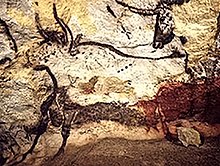Historia mundi



Historia mundi describit historiam hominum secundum materias archaeologicas et scriptas investigatas. Historia antiqua nota coepit cum scriptura inveniretur.[1][2] Fundamenta autem civilizationis ad primam technologiam introductam et culturam excogitatam retro extenduntur. Praehistoria Aevo Palaeolithico ("Primo Aevo Lapidis") incipit, quod Aevum Neolithicum ("Novum Aevum Lapidis"), et Revolutio Neolithica (inter 8000 et 5000 a.C.n.) in Luna fertili secuta sunt. Illud aevum mutationem maximi momenti in historia hominum vidit, cum homines ordinatam plantarum et animalium tutelam inciperent.[3][4][5] Agricultura progrediebatur, et plurimi homines vitam nomadicam reliquerunt et agricolae in coloniis perennibus facti sunt. Nomadismus in nonnullis locis continuabat, praecipue in regionibus secretis ubi erant paucae species plantarum quae domari poterant.[6]
Ubi progrediebatur, agricultura divisionem laborum incitavit ut cibus inter vera reservaretur. Inde divisio laborum ortum classis otiosae institutionemque urbium effecit.
Res historicae
[recensere | fontem recensere]- Historia oeconomica mundi
- Cultus humanus
- Evolutio hominis
- Potestas ignis
- Potestates historicae
- Demographia mediaevalis
- Historia agriculturae
- Historia scientiae
- Historia technologiae
- Historiographia
- Inundatio (mythologia)
Historia per regionem
[recensere | fontem recensere]- Historia Africae
- Historia Asiae
- Historia Europae
- Historia Orientis Medii
- Historia Oceaniae
- Historia Americarum
- Historia Antarcticae
Notae
[recensere | fontem recensere]- ↑ Secundum David Diringer ("Writing", Encyclopedia Americana, (1986), 29:558: "Writing gives permanence to men's knowledge and enables them to communicate over great distances. . . . The complex society of a higher civilization would be impossible without the art of writing."
- ↑ H. Webster, (1921), World history. Bostoniae: D.C. Heath. p. 27.
- ↑ Colin Tudge, Neanderthals, Bandits and Farmers: How Agriculture Really Began (Londinii: Weidenfeld & Nicolson, 1998, ISBN 0-297-84258-7).
- ↑ Peter Bellwood, First Farmers: The Origins of Agricultural Societies (Blackwell Publishers, 2004, ISBN 0-631-20566-7).
- ↑ Mark Nathan Cohen, The Food Crisis in Prehistory: Overpopulation and the Origins of Agriculture (Portu Novo et Londinii: Yale University Press, 1977, ISBN 0-300-02016-3).
- ↑ Vide Jared Diamond, Guns, Germs and Steel.
Bibliographia
[recensere | fontem recensere]- Ankerl, Guy. Coexisting Contemporary Civilizations: Arabo-Muslim, Bharati, Chinese, and Western, Geneva, INUPRESS, 2000, ISBN 2-88155-004-5.
- The Biosphere (A Scientific American Book), San Francisco, W.H. Freeman and Co., 1970, ISBN 0-7167-0945-7.
- Blainey, Geoffery. 2000. A Short History of the World. Penguin Books, Victoria. ISBN 0-670-88036-1.
- Braudel, Fernand. 1974. Capitalism and Material Life, 1400–1800. Novi Eboraci: HarperCollins. ISBN 0-06-010454-6.
- Braudel, Fernand. 1996. The Mediterranean and the Mediterranean World in the Age of Philip II. Berkeleiae: University of California Press. ISBN 0-520-20308-9.
- Diamond, Jared. 1996. Guns, Germs, and Steel: The Fates of Human Societies. Novi Eboraci: W. W. Norton. ISBN 0-393-03891-2.
- Ebrey, Walthall, et Palais. 2006. East Asia: A Cultural, Social, and Political History. Bostoniae: Houghton Mifflin Company. ISBN 0-618-13384-4.
- Energy and Power. 1971. A Scientific American Book. Franciscopoli: W. H. Freeman and Co. ISBN 0-7167-0938-4.
- Fukuyama, Francis. 1992. The End of History and the Last Man. Free Press. ISBN 0-02-910975-2.
- Gombrich, Ernst H. 2005. A Little History of the World. Yale University Press.
- Hodgson, Marshall. 1933. Rethinking World History: Essays on Europe, Islam, and World History. Cantabrigiae.
- Nordhaus, William D. 2015. A New Solution: The Climate Club. Recognitio Gernot Wagner et Martin L. Weitzman, Climate Shock: The Economic Consequences of a Hotter Planet (Princeton University Press), The New York Review of Books 62(10):36–39, 4 Iunii.
- Kennedy, Paul. The Rise and Fall of the Great Powers: Economic Change and Military Conflict from 1500 to 2000, Novi EboraciL:Random House, 1987, ISBN 0-394-54674-1.
- Parker, G. 1997 The Times Atlas of World History. Londinii: Times Books.
- Pomeranz, Kenneth. 2000. The Great Divergence: China, Europe and the Making of the Modern World Economy. Princetoniae.
- Ponting, Clive. 2000. World History: a New Perspective. Londinii.
- Reezs, Martin. interviewed by Erin Biba, "An Apocalypse Think Tank", Scientific American.
- Spodek, Howard. 2001. The World's History: combined volume. Upper Saddle River, NJ, Prentice Hall.
- Trompf, G. W. 1979. The Idea of Historical Recurrence in Western Thought, from Antiquity to the Reformation. Berkeleiae: University of California Press. ISBN 0-520-03479-1.
- Wells, H. G. 1920. The Outline of History. Volume One. Novi Eboraci: MacMillan.
- Weech, W. N., ed. 1944. History of the World. Londinii: Odhams, Long Acre.
- Williams, H. S. 1904. The historians' history of the world; a comprehensive narrative of the rise and development of nations as recorded by over two thousand of the great writers of all ages. Novi Eboraci: The Outlook Company.
- Wright, Ronald. 2004. A Short History of Progress. Toronti: Anansi ISBN 0-88784-706-4.
Bibliographia addita
[recensere | fontem recensere]- Fournet, Louis-Henri. 1986. Diagrammatic Chart of World History. Editions Sides. ISBN 978-2-86861-096-6.
- Gonick, Larry. 1997. The Cartoon History of the Universe. Vol. 1, Main Street Books, 1997, ISBN 978-0-385-26520-1, Vol. 2, Main Street Books, 1994, ISBN 978-0-385-42093-8, Volume Three, W. W. Norton & Company, 2002, ISBN 978-0-393-32403-7.
- Landes, David. 1999. The Wealth and Poverty of Nations: Why Some Are So Rich and Some So Poor. Novi Eboraci: W. W. Norton & Company. ISBN 978-0-393-31888-3.
- Landes, David. 2006. "Why Europe and the West? Why Not China?" Journal of Economic Perspectives 20:2.
- McNeill, William H. 1963. The Rise of the West: A History of the Human Community. Sicagi: University of Chicago Press.
Nexus externi
[recensere | fontem recensere]- "Crash Course World History," www.youtube.com
- Gobekli Tepe, science.nationalgeographic.com
- Museum Britannicum. A History of the World, www.britishmuseum.org
- Pella, John, et Erik Ringmar. History of International Relations Open Textbook Project, wayback.archive.org.
